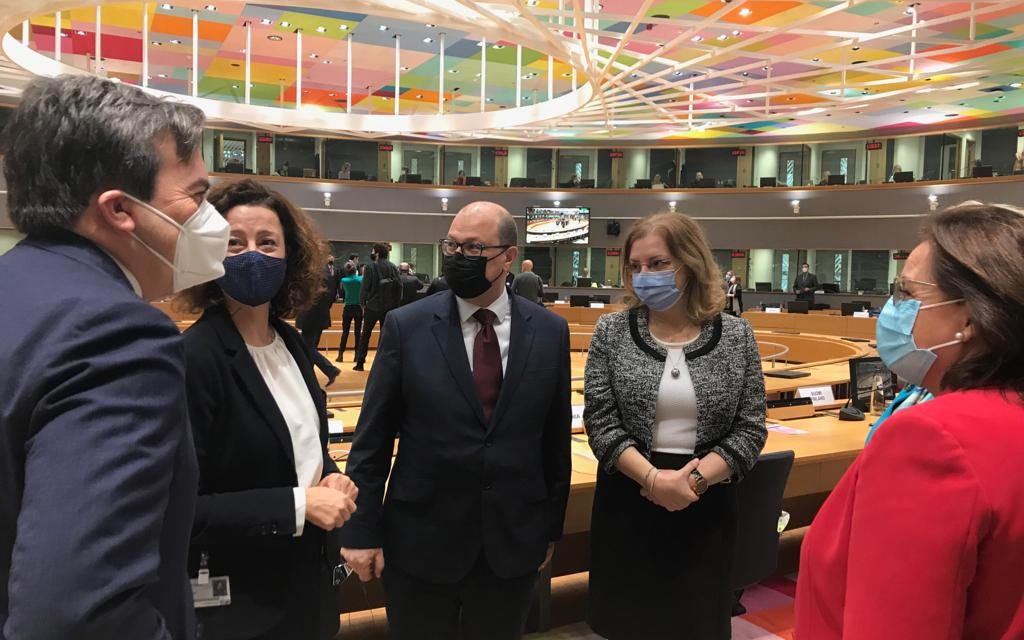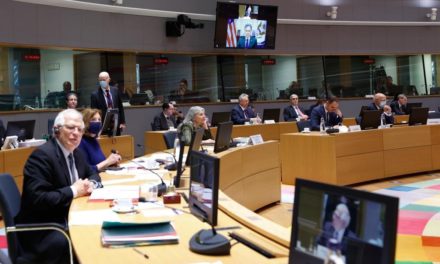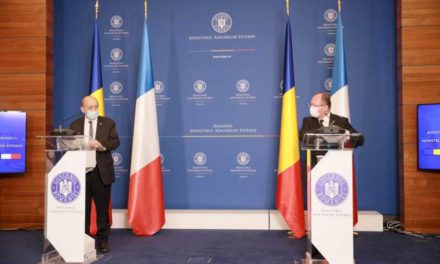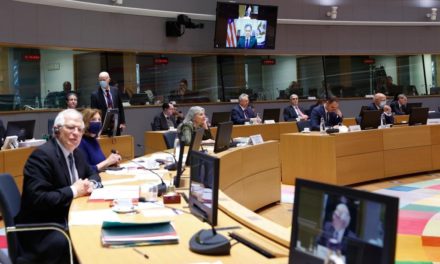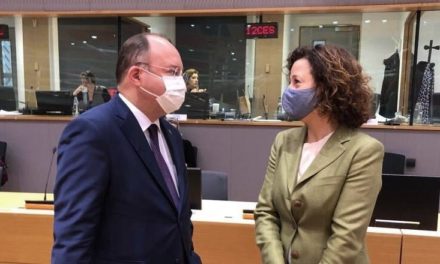Ministrul afacerilor externe Bogdan Aurescu a participat, vineri, 27 mai 2022, la reuniunea Trilateralei pe teme de securitate a miniștrilor afacerilor externe din România, Polonia și Turcia, desfășurată la Istanbul, împreună cu ministrul polonez al afacerilor externe, Zbigniew Rau, și cu ministrul turc al afacerilor externe, Mevlüt Çavuşoğlu, gazdă a reuniunii. Reuniunea Trilateralei a avut loc în contextul situației speciale de securitate generate de agresiunea ilegală a Rusiei împotriva Ucrainei și în contextul aniversării în 2022 a 10 ani de la crearea acestui format.
Agenda discuțiilor a cuprins subiecte de interes pe dimensiunea de securitate cu accent pe contextul actual regional generat de agresiunea Rusiei împotriva Ucrainei, temele de interes prioritar de pe agenda NATO, în special deciziile care urmează să fie luate în cadrul Summitului NATO de la Madrid, inclusiv privind consolidarea posturii de descurajare si apărare aliate pe Flancul Estic, și negocierea Noului Concept Strategic al NATO, precum și viitorul consolidării dialogului trilateral, inclusiv prin dezvoltarea de noi proiecte.
Declarațiile în format video sunt disponibile AICI.
Prezentăm, mai jos, declarațiile de presă, în limba engleză, susținute de ministrul Bogdan Aurescu după reuniunea Trilateralei pe teme de securitate România – Polonia – Turcia, de la Istanbul din 27 mai 2022:
Dear Minister Çavuşoğlu, dear Mevlüt,
Dear Minister Rau, dear Zbigniew,
Ladies and Gentlemen,
Let me begin by conveying a message of full appreciation for our host. Dear Mevlüt, I’m honored to be here today in Istanbul, for yet another fruitful dialogue in our trilateral format on security issues. Our meeting today has been both timely and necessary, on one hand because we are facing a lot of threats and challenges in our immediate, close neighborhood; on the other hand, because this year is an anniversary year.
As you both mentioned, we are marking ten years since the launch of this format and for me, personally, as the one who, ten years ago, had the initiative to convene for the first time this format, and as a participant to the first meeting of this format in the margins of the NATO Summit in Chicago, at the level of Deputy Minister, this anniversary has a very special meaning.
In the last decade, we have made significant progress in advancing our trilateral interaction, both in terms of political dialogue, but also in terms of practical cooperation. This Trilateral went from a very useful instrument for close coordination and engagement to an influential format, where three important Allies on the Eastern Flank and the Southern Flank discuss the most pressing issues in the complex situation that we face.
We talked today about essential aspects, to the benefit of the security of our citizens as NATO Allies, and we have focused on the main topics of interest on the current security agenda. And, of course, the crisis in Ukraine and its multifaceted implications have been the main subject of our debates.
As Allies on the Eastern Flank of NATO, we share the concern about the destabilizing impact of the illegal Russian aggression against Ukraine, for regional, for European and for Euro-Atlantic security as a whole. The parameters of the security architecture in Europe and in the Euro-Atlantic space were very much affected by the illegal war which was started by Russia against Ukraine, and our duty is to, on one hand, reinforce the Euro-Atlantic security and, on the other, to safeguard the rules-based international order.
We are now in a totally different reality from where we were a couple of months ago. It is an unprecedented threat that we have to deal with accordingly. I have underlined in our talks today that our most important task now, as Allies, is to safeguard the Euro-Atlantic security in the long-run.
The decisions that our leaders have taken during the extraordinary NATO Summit in March opened a new chapter in our endeavor for a stronger, better integrated and more coherent posture for NATO. And for us, for Romania, the most important and first priority for the Madrid Summit in June is to take bold decisions, as an Alliance, to consolidate the posture of deterrence and defense on the Eastern Flank in the long-run, in a balanced and unitary manner, from the Baltic Sea to the Black Sea, especially in the South, where Romania is located. The new Battle Group in Romania is the first important step in this direction.
We have also pointed on the need to continue the support and assistance to Ukraine in order to increase its resilience in addressing the threats and challenges it faces. Romania made a multidimensional effort to support Ukraine’s efforts, to support the refugees coming in Romania – more than 1.000.000 people who crossed our borders – and the humanitarian effort was, indeed, substantial.
At the same time, we are supporting the economy of Ukraine by facilitating the transfer of Ukrainian goods, including grain, through our ports on the Danube and the Black Sea through the Constanța Port, the largest in the Black Sea, towards other destinations. And we have discussed today how to work together with other partners in order to create a transport corridor to enable the transfer of the Ukrainian agricultural products towards third destinations. Of course, this corridor must include the Black Sea and the Black Sea straits. And of course, it is important, from this perspective, to take into account all possible aspects, including protecting the commercial vessels from the floating mines.
In this context, I have also underlined the profound destabilizing effect of the Russian actions for the region and the importance to continue to engage effectively and constructively in supporting our close partners, the Republic of Moldova and Georgia.
During the second session, we have discussed about the preparation for the Madrid Summit. We have discussed about the Strategic Concept, which is expected to be one of the most visible results of the Summit, setting the profile and the objectives of the Alliance for at least the next decade. It is a topic of high relevance for our countries, as it is our joint interest for NATO to consolidate its profile as the most successful political military organization in history. In Romania’s view, this document has to be ambitious, give priority to collective defense and define Russia as a threat, anchored in the current reality shaped by the Russian aggression against Ukraine.
There is nothing theoretical about our discussions anymore. We have to have a Strategic Concept which is very much focused on nowadays’ realities, on what we need now.
And we need to make NATO more powerful, united and able to face all current and future consequences and challenges.
Of course, we have discussed about the enlargement, about the accession of Finland and Sweden. We are a firm supporter of the “Open Doors” policy, which brings benefits for the Alliance as a whole, and we believe that the accession of these two countries will consolidate the collective defense and our security.
Of course, we have praised the efforts for constructive dialogue, which are being underway, and we hope that this dialogue will bring very soon concrete and positive results – I have been in close contact, including yesterday, with my colleagues from Sweden and Finland. So we do hope that we will have good news.
Last, but not least, we had a very good exchange of views on the way ahead for our trilateral format. We have taken stock of the progress achieved in implementing concrete projects and we have analyzed possible new directions to concentrate our efforts for the future. Given the current security challenges, I have pointed to the need to align and adapt our efforts with the focus on our Eastern Neighborhood.
At the last Foreign Ministerial in 2021, which I had the pleasure to host in Bucharest, we have invited, upon my initiative, the Foreign Ministers of Ukraine and Georgia at that time. It was a time of growing tension, which unfortunately has degenerated into the current crisis, but I think this kind of dialogue should continue and I think we need and we want to further engage with both Ukraine and Georgia and share their evaluations on regional security. We should also consider inviting the Republic of Moldova, perhaps other partners, to have a comprehensive perspective on the security in the region.
Another point we should further look into is advancing our coordination on resilience. Last year, Romania established in Bucharest the Euro-Atlantic Resilience Center and the center is operational. And we would welcome having our Turkish and Polish friends participating in its activities.
Thank you once again, dear Mevlüt, for organizing in perfect conditions this meeting and I am looking forward to continue our valuable dialogue and cooperation, including at the highest level, and also next year in Warsaw.
Thank you!
Reporter: Turkey and Romania traditionally had had close relations as allies and strategic partners. Also, Romania is one of Turkey’s top trade partners in the Balkans. The trade has been updated as 15 billion dollars. So my question to the minister is: in order to reach this target and to further develop the relations, what do you think are the priority areas?
Bogdan Aurescu: Thank you so much for this question. Before the Trilateral meeting, I had the pleasure and honor to have, together with my friend Mevlüt, a round of bilateral consultations and we have discussed in detail how to further expand our bilateral relations.
We have discussed about our political interaction, which is very good. We discussed about the perspective to have, between Romania and Turkey, a Joint Government Meeting’ type of mechanism, which is a very good mechanism to stimulate further our bilateral relations and the development and deepening of our Strategic Partnership, and of course we have discussed about our economic relations. We have noticed that the trade is increasing between us, despite the challenging regional context, despite the effects of the pandemic, despite the effects of the crisis in our close proximity.
Last year we have reached more than 8,6 billion dollars in exchanges, which is already a lot, but we want more. And that is why during a very recent meeting of the Joint Economic Commission, we decided to fix another target and to work more. There is a lot of interest between the business communities from our two countries to work more on that. We will, at political level, encourage in a very strong way this interaction and there are a lot of opportunities for doing business between us. So this is one of the most important priorities that we have discussed during our meeting. Thank you.

